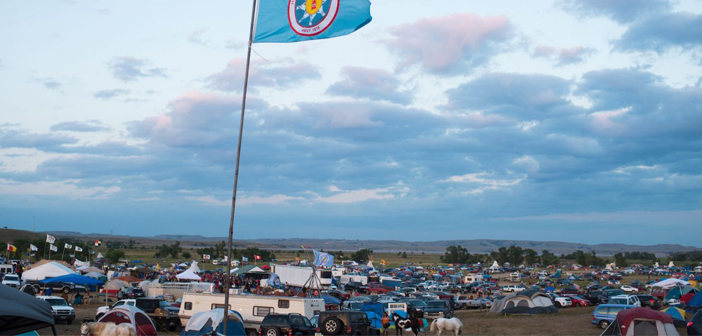Standing Rock için Ermeni diasporasından destek


Yerli Amerikalılar için büyük öneme sahip Standing Rock bölgesine doğalgaz hattı döşenmesi konusu, bir süredir ABD’nin gündemini meşgul ediyordu. Başta Yerli Amerikalılar olmak üzere birçok ABD’linin direnişi sonucunda proje, fiilen başkanlık görevini sürdüren Barack Obama’nın talimatıyla rafa kaldırıldı. Yerli Amerikalıların yanı sıra ABD Ordusu’nda görevli olan eski askerler ve gaziler de Standing Rock direnişine destek verdi; bazı askerlerin geçmişte Yerli Amerikalılara uyguladığı şiddet için özür dilemesi büyük yankı uyandırdı. Direniş sırasında ABD’deki Ermeni diasporasından önemli isimler de direnişe destek verdi. ABD’deki Ermenilerin destek vermesinde öncü rol oynayan akademisyen ve aktivist Khatchig Mouradian, konu hakkında değerlendirmelerde bulundu.
Standing Rock’ın Yerli Amerikalılar için önemi nedir?
Dakota Boru Hattı’nın (DAPL) inşaası, kaynak sularını koruyanlara yönelik şiddet ve DAPL’ye karşı direnenler birbirinden ayrı vakalar değil: Yerli Amerikalılar yıllardır ABD’nin her yerinde benzer girişimlere karşı direniyorlar. Ayrıca, yüzlerce yıldır süren şiddet ve mülksüzleştirme ile bu eylemlerin bugün gördüğümüz daha üstü kapalı tezahürleri arasındaki doğrudan bağa da dikkat çekilmesi gerekiyor. Standing Rock, yerli kabileler ile ülkenin dört bir yanındaki yoldaş destekçileri arasında eşi benzeri görülmemiş bir yakınlaşmayı temsil ediyor; bu insanlar olanlara karşı durarak “Artık yeter!” dediler. Mücadele henüz bitmemiş olsa da güçlü şirketlere, kurumsallaşmış siyasete ve büyük ölçüde sessiz kalan ana akım medyaya karşı yürütülen hareket başarıya ulaştı.
Amerikalı Ermenileri direnişe destek vermek üzere nasıl bir araya getirdiniz?
Birçok Amerikalı Ermeni sanatçı, aktivist ve aydın son aylarda Standing Rock’tan haber geçerek, hukuki destek ekibine dahil olarak, protestolara katılarak ve birkaç platforma farkındalık yaratılmasına katkıda bulunarak #NoDAPL hareketine dahil oldu. Bu insanlardan bazılarına Kasım ayının sonunda ulaştım ve sadece 24 saat içinde yaklaşık 40 kişilik bir imzacı listesi oluşturarak bildiriyi yayınladım.
Ermenilerin yerlilere verdiği desteğin öneminden bahsedebilir misiniz?
Ermenilere ve Yerli Amerikalılara uygulanan soykırımın mirası arasında tüyler ürpertici benzerlikler var. Soykırımdan kurtulanların soyundan gelen insanlar olarak, çevrenin ölçüsüzce ve utanmazca sömürülmesine ve ABD’deki yerlilerin haklarının ihmal edilmesine karşı yürütülen bu mücadeleye karşı sessiz kalamazdık. Eğer ABD’de bunların yaşanmasına müsaade eder ve ses çıkarmazsam, okyanus ötesindeki Türkiye’de yaşanan Ermeni Soykırımı’nın sonuçlarına karşı mücadele edemem. Kamp Armen’in yanında olduğum için Standing Rock’ın da yanındayım. Nasıl ki Hrant Dink, Sevag Balıkçı ve Tahir Elçi için adalet talep ediyorsam, polislerin silahsız siyahları vurmasını da protesto ediyorum.
‘Bu eyleme sessiz kalamayız’
30'dan fazla imzacı arasında sanatçı ve aktivist Serj Tankian, oyuncu ve senarist Eric Bogosian, romancılar Chris Bohjalian, Micheline Aharonian Marcom, Aline Ohanesian, ve Nancy Kricorian, sanatçı ve yazar Vahe Berberian, gazeteci ve yazar Mark Arax ve gazeteci David Barsamian bulunuyor.
İmza metninde, boru hattı inşaatının çevreye karşı tehlike arz ettiği ve Amerika Yerlileri'nin haklarını ihlal ettiği belirtildi. Açıklamada şu ifadeler yer adlı:
“Bu, yüzlerce yıldır yürütülen mülksüzleştirme ve yıkım politikalarının ve yerli halkın haklarının inkarının devamından başka bir şey değildir. Ermeni Soykırımı'ndan kurtulanların soyundan gelen insanlar olarak, bu eylemlere karşı sessiz kalamayız.
Bir grup Amerikalı Ermeni sanatçı, akademisyen ve aktivist olarak Standing Rock Sioux Kabilesi'nin Dakota Boru Hattı (DAPL) inşaatına karşı mücadelesinde yanlarındayız. Su kaynaklarını ve çevreyi tehdit eden boru hattı, Amerika Yerlileri'nin kutsal topraklarını da ihlal ediyor. Bu, yüzlerce yıldır yürütülen mülksüzleştirme ve yıkım politikalarının ve yerli halkın haklarının inkarının devamından başka bir şey değildir. Ermeni Soykırımı'ndan kurtulanların soyundan gelen insanlar olarak, bu eylemlere karşı sessiz kalamayız. DAPL'ye direnen Standing Rock Sioux kabilesinin mücadelesine ses veriyoruz.”


